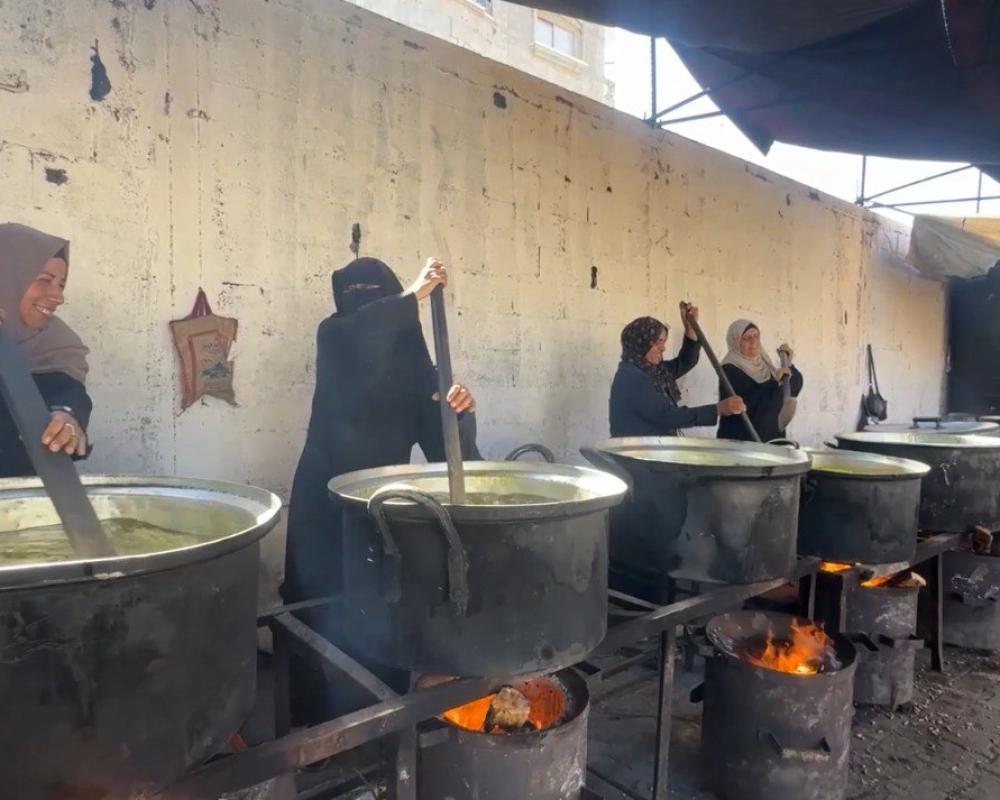Gaza / PNN/
Palestinian women in the Gaza Strip continue to endure unimaginable hardships since the beginning of Israel’s war of extermination against the besieged enclave. Women have been forced to take on additional responsibilities — caring for children, the elderly, and the sick — amid conditions where the most basic necessities of life no longer exist, leaving them among the primary victims of the ongoing devastation.
Even after the guns fell silent, Palestinian women in Gaza are still facing severe daily struggles. Alongside men, they continue striving to secure the essentials of survival after Israel reduced Gaza’s cities, camps, and villages to piles of rubble and broken concrete. Behind this destruction lies the silent suffering of thousands of women who lived — and continue to live — through unspeakable pain long after the bombings and shelling have stopped.
Despite these immense challenges, Palestinian women remain steadfast. With unyielding willpower and resilience, they continue to stand side by side with men — tending to the wounded and sick, helping to build tents for displaced families, and volunteering in communal kitchens and food distribution centers both during and after the war. Their commitment to volunteerism and solidarity reflects deep-rooted values in Palestinian national culture — the spirit of “al-‘awneh” (mutual aid) — especially in times of crisis and conflict.
Um Haya: “Our Day Begins at Dawn to Support Our People”
At dawn, volunteer Um Haya Abdel-Razzaq, from Al-Nuseirat Camp, begins her daily journey to the community kitchen in the camp. Ignoring her diabetes, her own fatigue, and her elderly husband’s illness (aged 63), she helps prepare meals for children and families in need.
“I wake up at six in the morning, wash my face, pray, and feed my husband because he’s sick,” Um Haya says. “I arrive at the kitchen around seven and do whatever is needed — chopping onions, potatoes, or eggplants — to help prepare the meals.”
After long hours of work, exhaustion takes its toll. “Sometimes I feel I can no longer walk because of my illness or the pain in my foot. I have to stop several times in the street before I can continue home,” she says. “When I finally get back, I rest for an hour or two, then start my duties again — feeding my husband, taking care of my daughters, and helping them with their studies.”
Um Haya describes the daily challenges: the difficult walk to reach the kitchen amid destroyed roads and the risk of airstrikes, and the heavy labor involved in preparing thousands of meals. “The hardest part is the distribution,” she says softly. “You see children, women, and men struggling just to get a small portion of food to survive — and your heart breaks a thousand times.”
Through tears, she adds: “I see the displaced and the children waiting at the kitchen doors, and I can’t hold back my tears. All I can do is try to ease their suffering in any way possible.”
Um Wissam: “We Volunteer Not Just for Food, But to Send a Message”
Um Wissam, another volunteer at the Al-Nuseirat kitchen, shares a similar story of endurance and compassion. “Despite the hardship at home — I have three children who suffer from epilepsy and seizures — I help prepare meals of pasta, rice, and lentils,” she says. “I assist needy families as our people continue to face unbearable living conditions.”

She explains that finding food itself has become a daily battle. “With the crossings closed and supply routes cut off, sometimes even basic ingredients like rice or lentils are unavailable,” she says. “But I don’t come here to eat. I come to send a message to the world — to look at us with mercy. We are a people who have suffered so much, and we continue to suffer.”
Determined to Keep Giving
Despite the harsh conditions both women face, Um Haya and Um Wissam vow to continue working alongside other women in Al-Nuseirat, many of whom now live in makeshift tents, to support displaced and impoverished families.
“There are so many women in Gaza who are sick or injured, who can’t find food or water,” says Um Haya. “Yet we keep going — walking long distances if we must — to find something, anything, for our children and families.”
Both women insist they will continue their voluntary efforts. “We will keep doing whatever we can for the displaced and for the people of Al-Nuseirat,” they affirm. “Even with all the pain and hardship we live through, we won’t stop.”
Reports from the United Nations and international organizations highlight the compounded pressures Palestinian women face under Israel’s ongoing blockade and war on Gaza. Women have become the backbone of survival — managing households, securing food and water, and caring for children and the elderly amid collapsing infrastructure and severe shortages of essential services.
Volunteer initiatives like Gaza’s community kitchens have become lifelines of hope and resilience, helping families fight hunger and poverty amid one of the most devastating humanitarian crises in modern history.
This story was produced within the framework of the “Qarib” program, implemented by the French Media Development Agency (CFI) and funded by the French Development Agency (AFD).




Source link
#Video #City #Starves #Women #Feed #Gazas #Kitchen #Volunteers #Defy #War #Hunger

